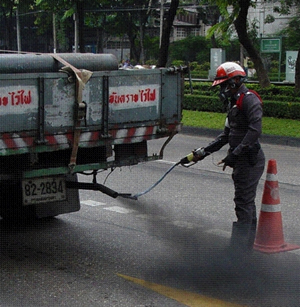| HOME | FAQS | SITE MAP | CONTACT US | |||
 |
|||
Asian Environmental Compliance and Enforcement Network (AECEN)REGIONAL COOPERATIONCoping with the environmental impact of rapid urbanization and industrial growth remains a significant challenge for Asia. While many governments have developed environmental legal and institutional frameworks to respond to this challenge, implementation and enforcement of environmental laws remains weak due in large part to technical, financial and human resource limitations. Common challenges include: overlapping and fragmented authority, limited interagency coordination, incomplete decentralization, lack of standardized procedures, weak human and institutional capacity, limited public outreach and involvement, and insufficient program data and performance indicators. AECEN: REGIONAL COOPERATION AND NETWORKINGIn 2005, with support from the United States Agency for International Development (USAID) and the Asian Development Bank (ADB), environmental agency leaders from 13 Asian countries established the Asian Environmental Compliance and Enforcement Network (AECEN), a regional practitioner network. AECEN’s mission is: to promote improved compliance with environmental legal requirements in Asia through regional exchange of innovative policies and practices. Network objectives are to:
NETWORK MEMBERS AND SECRETARIATNetwork members are national and sub-national agencies from Asian countries committed to improving compliance and enforcement through regional cooperation and information exchange. Members appoint national coordinators responsible for the development and implementation of environmental policies and laws, including compliance promotion and enforcement. An Executive Committee, composed of representatives from members and sponsoring development agencies, serves as the governing body of the Network. At present, network members include environmental agencies from: India, Indonesia, People’s Republic of China, Philippines, Singapore, Sri Lanka, Thailand, and Vietnam. With support from USAID and ADB, the AECEN Secretariat works with members to support the design and implementation of country and regional activities. The Secretariat also provides an information support and coordination function, including assisting in organizing the AECEN Annual Forum. NETWORK ACTIVITIESSharing best practices and strategies on effective environmental compliance and enforcement is at the heart of AECEN. With support from the AECEN Secretariat and network partners, members engage in activities that strengthen legal and regulatory frameworks and human and institutional capacity for improved compliance and enforcement. Primary activities include:
The AECEN Secretariat prepares an annual work plan of all network activities for review and approval by the AECEN Executive Committee. Success Stories Country Program Assessments Country Pilot Activities Regional Cooperation and Training Compliance and Enforcement Indicators Annual Forum AECEN PARTNERSIn addition to USAID’s Environmental Cooperation-Asai (ECO-Asia), AECEN partner organizations and networks include: Asian Development Bank (ADB), United States Environmental Protection Agency (EPA), World Bank, Organisation for Economic Cooperation and Development (OECD), Institute for Global Environmental Strategies (IGES), International Network of Environmental Compliance and Enforcement (INECE), Regulatory Environmental Programme Implementation Network (REPIN), Balkan Environmental Regulatory Compliance and Enforcement Network (BERCEN), European Union Network for the Implementation and Enforcement of Environmental Law (IMPEL), and Clean Air Initiative- Asia (CAI-Asia). CONTACTJohn R. Pasch FURTHER READING | |||
|
|||
